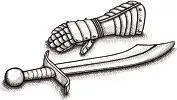Jonathan Howard - Johannes Cabal: The Fear Institute
- Название:Johannes Cabal: The Fear Institute
- Автор:
- Жанр:
- Издательство:неизвестно
- Год:неизвестен
- ISBN:нет данных
- Рейтинг:
- Избранное:Добавить в избранное
-
Отзывы:
-
Ваша оценка:
Jonathan Howard - Johannes Cabal: The Fear Institute краткое содержание
Johannes Cabal: The Fear Institute - читать онлайн бесплатно полную версию (весь текст целиком)
Интервал:
Закладка:
Cabal shook his head. ‘No.’
There was silence for some minutes but for the crackling of the campfire. Then Holk said, ‘Make it quick, Master Cabal.’
When the others arrived back, carrying wood, Cabal was already sewing Holk into his bedroll. ‘Better it were done quickly,’ he said, as they stood over him. His eyes were not cold, but they were empty, and when he looked up, at least one of them wondered if they had left all the monsters behind them.
‘But,’ said Thirsh, both horrified and relieved, ‘you said . . . a wamp . . . you said . . .’
‘I took a leaf from Ercusides’ book,’ said Cabal, calmly. Covered by the sheet, none could see the thin stake Cabal had fashioned from a fallen branch, then driven through Holk’s eye and into his brain once he had breathed his last breath. There would be no wamp cracking its way out of Holk’s skull.
They made a pyre and placed Holk upon it. As he burned and the wamp filth in his veins boiled and died, Cabal threw the block of sinew wood he had been carrying on his saddle pack into the flames, and they watched it twist and flex as the fire took it too. It would have been about large enough to carve a wooden leg from, but that happenstance was now gone for ever. When the fire finally burned low, Cabal gathered up Gesso’s helmet, unfastened the chain lattice running across its mouth, and let the dreff free. They watched it run up the hillside towards the treeline. Two thirds of the way there, a white eagle with lines of black and gold upon its wings stooped down from the cloudy sky and took the dreff cleanly, flying away with the unmoving animal in its claws. If it was an omen, it was an uncertain one.
Their arrival in Baharna was unheralded. They rode in during the morning of a market day, overtaken by farmers, traders and lava gatherers, and the little troupe of dusty travellers sitting silently on their zebra mounts drew little attention, or even that two unridden zebras followed the column, led by their tied-off reins.
Their passage through the eastern gate was untroubled: the guard who dealt with them had been on duty the day they left and already knew where they had been. He eyed the trailing zebras, but said nothing.
Once within the city, Shadrach concluded their dealings with Osic and Thirsh. Holk had no family, but Gesso had a wife and a young daughter. Shadrach refused to be taken to see them, but gave the zebras to Thirsh, with a fistful of gold, and told him to see Gesso’s family all right. As the mercenaries walked away, Corde moved alongside Shadrach and said, ‘How do we know they were telling the truth? Gesso never spoke of a family – we only heard of them after he was dead. How do we know they haven’t just taken you for a fool?’
Shadrach just looked at Corde with something like loathing in his face. ‘We don’t know,’ he said in disgust, and turned away, abandoning a dialogue before it had even started.
Cabal had noticed that Shadrach had seemed to be ageing rapidly ever since the battle in the nameless city on the banks of the Lake of Yath. His hair was greying at the temples, the lines of his face deepening, and now he walked with a stoop. It seemed that the Dreamlands were not the only thing that could be physically influenced by the psyches of dreamers.
In contrast, Corde was developing a distinctly lean and hungry look. Whereas earlier he had only been play-acting the role of a latter-day Caesar, now his profile was becoming more patrician, his eyes hooded and predatory, and his armour seemed far less of an affectation than it once had. There was something thoroughly rapacious about the way he watched Osic and Thirsh carry on down the Great Market thoroughfare, the string of zebras behind them. It was the expression of a man denied his spoils and already scheming to regain them. Cabal did not care for it at all, and put part of his intellect to the task of devising ways to dispose elegantly of Corde should he prove troublesome.
Having placed an abeyant death sentence on Corde’s head, he turned his attention to Bose, who, for his part, looked vapid and without a shred of malice or machinatory instinct about him, a soft toy in the great department store of life. In short, just the same as he always did. He seemed to bimble around the Dreamlands like somebody at a museum exhibit of how frightful foreigners are. He would look, and gasp, and be appalled, then go home, have a boiled egg for tea and be utterly untouched by what he had seen in any lasting sense.
Inevitably, Cabal wondered if he, too, was changing in appearance. If the mechanism was one of altered perceptions, then it was unlikely; he was as sure as he could reasonably be that he was of the same mind and worldview as he had been the day that the Fear Institute had first come to call. It’s difficult to be objective about the subjective, but Cabal maintained assorted mental checks and balances to confirm that he was reasonably sure his mentality remained recognisable, and that he had not gone inconveniently mad. As Descartes would have been quick to tell him, his perceptions could not necessarily be trusted, but – then again – if he was so mad that he didn’t realise he was utterly mad, it was academic anyway. He would have failed in his life, and that was that. He could just get on with learning to enjoy institutional food and the sure knowledge that electricity makes your eyes go black.
Still, things were progressing, at least. They had a faint idea where to go next, to speak with someone else who was probably dead, who might not be able to help them whether he breathed or not, and who might be able to direct them to somewhere that might or might not hold the Phobic Animus, but which was ludicrously dangerous in either case. Cabal had a sense that the whole expedition had long since taken on the character of certain doom, but was dooming them all so very, very slowly that it was difficult to get upset about it. It was like travelling by glacier to be hanged.
True, they had also lost two men, but neither had been him, so that was of limited concern.
Surviving fragments of Cyril W. Clome’s manuscript for The Young Person’s Guide to Cthulhu and His Friends: No. 3 Azathoth, the Demon Sultan
Azathothis as huge as anything (except Yog-Sothoth, who is as huge as everything), but do you know, O best beloved, he’s as mindless as . . . Well, there’s the thing. Nothing is as mindless as Azathoth (who is sometimes called the ‘Demon Sultan’, although never to his face, but then he doesn’t have a face). Think of the most stupid thing you can. A flatworm? No, that’s cleverer than Azathoth. A rock? No, that’s still brighter than he. A Member of Parliament? Shocking as it may seem, O best beloved, far more obtuse even than that. Azathoth is so cosmically stupid that he saps the intelligence from those who see him, big old chaos beyond angled space that he is. Why, if you were to take the biggest fool in the world to see him, the fool’s wits would still steam out of his ears. And if you took the thousand cleverest people in the world, their minds would spill into the void, like water from overturned goblets, but all their cleverness would not even dampen the burning void of Azathoth’s mindlessness. Still, it’s fun to try.

Chapter 11
IN WHICH IT TRANSPIRES THAT DYLATH-LEEN IS NOT VERY NICE
Captain Lochery was at sea, it transpired, and they therefore had to make alternative arrangements to go westwards from Baharna. This was how they came to be sharing a table with two merchants swathed in heavy black robes that left only their faces exposed, an unfortunate oversight in Cabal’s opinion. The merchants smiled and chuckled and smirked and giggled and rubbed their heavily bejewelled gloved hands and tittered and were so transparently evil that he spent much of the time watching his colleagues for the moment when the penny must surely drop. After almost an hour of oleaginous dickering, Shadrach and the others were all set to buy passage aboard the merchants’ black galley. Wearily Cabal realised that he would have to save the day again. Luckily, he could do it by being monumentally rude.
‘So, gentlemen,’ he said to the merchants, ‘you undertake to transport we four to Dylath-Leen in safety and comfort. That is the deal, yes?’
‘Yes, O most perspicacious one,’ said one of the merchants – it barely mattered which – smiling and nodding and smiling some more.
‘Really, Mr Cabal,’ said Shadrach sharply, ‘you haven’t said a word in an age, and now you wish to be involved in the negotiation. I have the matter well in hand, I assure you.’
‘Oh,’ said Cabal, chastened. ‘My apologies, Herr Shadrach. Forgive my interruption. Please, carry on . . .’ he leaned back in his chair and then added, quietly but clearly ‘. . . selling us into slavery.’
‘What?’ said Corde. He looked at Cabal in surprise, then swung his gaze to the merchants, his expression hardening. He did not much care for Cabal’s company, but he knew his instincts to be good.
‘These creatures before you, and I say “creatures” advisedly, mean to capture us all and use us as slaves. At the conclusion of your discussion they will call for wine to celebrate the agreement. The wine will, of course, contain enough soporifics to stun a shoggoth. The intention is that, when we wake, we shall find ourselves aboard the fetid black galley, which – incidentally – is safe and comfortable only for these . . . people. Finally, we shall be dumped upon the Moon. Yes!’ (He said it quickly to overrule Shadrach’s dismissive ‘Oh!’) ‘The Moon is a viable environment in the Dreamlands, and it is inhabited by these . . . people’s employers, who are white and toad-like and hideous. They get through slaves quite rapidly, by a dual process of attrition and peckishness, hence a steady demand for replacements. It says little for the acuity of the Dreamlands’ citizens that the merchants of the black galleys have been plying this trade for millennia, using precisely the feeble technique we see this evening, and people still fall for it.’
‘Is all lies,’ said one merchant, cheerfully.
‘We has deck quoits,’ said the other, happily.
‘No doubt you do,’ said Cabal, climbing to his feet, ‘and that is another excellent reason not to travel with you. Good night, gentlemen,’ he said to Shadrach, Bose and Corde. ‘I shall see you in the morning, when we shall look for a real captain who has a real chance of getting us to Dylath-Leen. If I do not see you, I shall assume you have decided to ignore my advice, have accepted the offer of these . . .’ he couldn’t bring himself to flatter them with people , given he knew full well that, beneath their robes, they were not even faintly human ‘. . . these things , and that you are bound for an interesting, if short and miserable, lunar experience.’ With that, he left.
On one side of the table Shadrach, Bose and Corde turned to regard the two merchants with manifest suspicion.
‘We has deck quoits,’ repeated the second merchant, blissfully, a sweetener that had always sealed the deal in the past.
‘We’ll try the docks tomorrow,’ said Corde to Shadrach, and left the table. Bose followed quickly, and a moment later, with some reluctance, Shadrach.
The two merchants sat smiling but nonplussed, looking around the room as if for an explanation as to why their infallible ruse had failed. After a few moments, two adventurers walked up to them, fine, swashbuckling types with chiselled jaws and declamatory voices.
Читать дальшеИнтервал:
Закладка:





